
| Type | Decentralized blockchain |
| Release Date | 30 July 2015 |
| Founder | Vitalik Buterin |
| Website | ethereum.org[1] |
What is Ethereum?
- Ethereum is a network of computers all over the world that follow a set of rules called the Ethereum protocol[1].
- The Ethereum network acts as the foundation for communities, applications, organizations and digital assets that anyone can build and use[1].
Blockchain
The concept of blockchain is crucial in understanding Ethereum.
What can Ethereum do[1]?
- Banking: Everyone is allowed to access Ethereum, and the lending, borrowing and savings products built on it is an internet connection.
- An open internet: Users can control their own assets and identity, instead of them being controlled by a few mega-corporations.
- A peer-to-peer (p2p) network: Ethereum allows users to coordinate, make agreements or transfer digital assets directly with each other.
- Censorship-resistant: No government or company has control over Ethereum.
- Commerce guarantees: Users have a secure, built-in guarantee that funds will only change hands if they provide what was agreed.
- Composable products: All applications are built on the same blockchain with a shared global state, meaning they can build off each other. This allows for better products and experiences and assurances that no-one can remove any tools apps rely upon.
NFT
Ethereum vs. Bitcoin
| Ethereum[2] | Bitcoin[3] | |
|---|---|---|
| Type | Decentralized blockchain | Digital currency |
| t
Market cap |
$222.4B | $568.1B |
| Popularity | #2 | #1 |
| All time high | $4,891.70 | $68,789.63 |
| Circulating supply | 120.2M ETH | 19.4M BTC |
| Total supply | Infinite | 21M BTC |